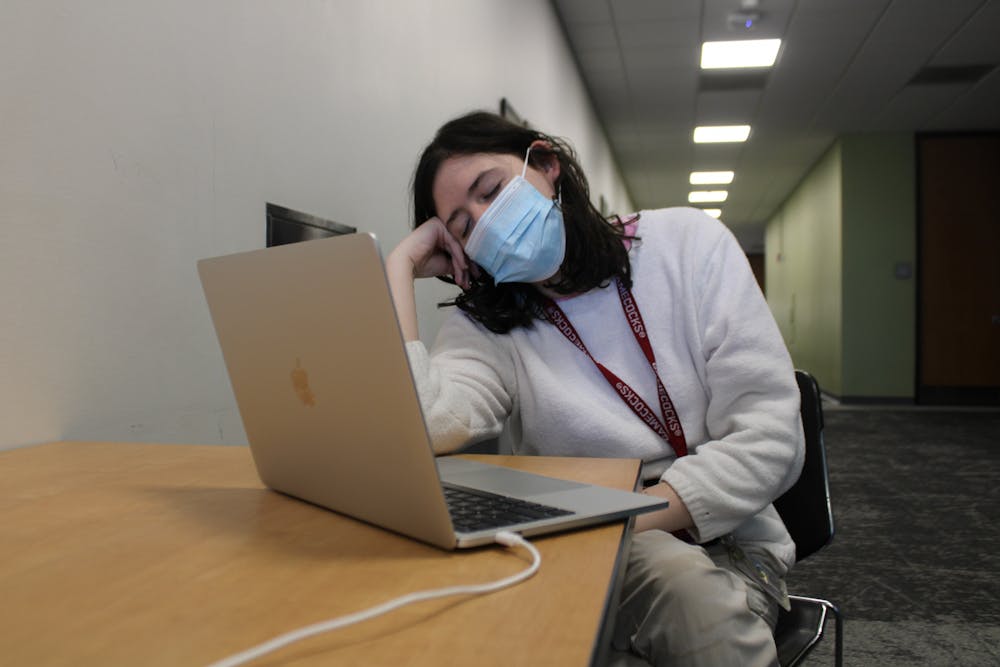COVID-19 was hard on students. They were met with feelings of uncertainty about the future in regard to the social climate and also what kind of education they were getting post-online classes, triggering many mental health issues.

In a study done by the Pew Research Center, 58% of adults between the ages of 18 to 29 experienced high levels of psychological distress since March 2020.
Gracie Lewis, a third-year psychology student, was a senior in high school when the school shutdown was announced. She said she didn’t think much of the situation and assumed she would return to school in a matter of weeks. She ended up with no prom, no spring break, no summer vacations and no proper graduation ceremony.
“It didn’t seem real at first,” Lewis said. "I almost didn't come to terms with it until right before I was about to start college in August and realized this is not going to be the college experience I was told about and heard about."
Many students were dealing with loss and isolation during the pandemic because of the abruptness of the quarantine. Students were so used to having their own space and independence and in a matter of weeks, most were back home with no clue when they would have their normal lives back.
Dr. Elizabeth-Clare Porter, the director of counseling and psychiatry for Student Health Services, said her experience while in the Student Health Center during the COVID-19 shutdown was difficult as the center worked to navigate running online services and supporting students.
"We saw students lose loved ones," Porter said. "We also saw students who lost important milestones in their lives ... those things are not easily reproducible, so they're kind of gone."
Porter said many students felt isolated during the quarantine.The switch from being completely on their own to going back to living at home was hard for students, and for some, it felt like taking a step back in their lives. They felt like they were put in an awkward position coming back to school and having to pick back up where they left off.
Lewis said it was an unusual space to be in during her freshman year of college, a time when you are newly independent and trying to form new relationships. Online classes made it harder for students to stick to a schedule, and, according to Lewis, this began to take a toll on her academics.
"Classes being online, I didn't have much responsibility," Lewis said. "Freshman year I definitely took a hit educationally. I have actually had to retake a class since because to me it was like I was stuck and there was really no point of doing all these things when I was stuck (and) it would never get better."
Since the transition from normalcy to complete isolation was so sudden, many services within the university had to make adjustments to attend to everything being moved online. During the pandemic, the Student Success Center focused on providing a plethora of online resources for students who were struggling to mentally focus on their schoolwork.
"The big thing was making sure that we were doing everything that we can at the Student Success Center to offer as much comprehensive support as possible," Chris Gulino, the assistant director for course-specific support at the Student Success Center, said. "That meant that we had to offer virtual services (and) we really expanded the amount of services that we offered virtually."
Gulino said that many students required flexibility at this time because their schedules were turned upside down and the transition to online school was adding to the other stresses of their lives. To combat this, the Student Success Center also provides peer consultants to help teach students how to manage their time and develop study skills during this switch back to in-person classes.
As we continue to transition to in-person classes again, it is important for the university to understand that, for the past two years, students have experienced a major shift in the way they learn. It is more difficult for them to sit in a crowded classroom and focus for long periods of time because they've fallen out of this habit due to online school. The Student Success Center is a great resource for students who are willing to ask for help, but for students who are not as comfortable, they risk falling behind.
Something USC should have focused more on coming out of the pandemic is slowing down the jump back into normalcy. Many students were quick to jump back into their pre-COVID-19 routines, feeling like they had to make up for lost time and, according to Porter, getting burnt out in the process.
Many students had to snap back to reality after COVID-19, making it hard for them to manage school and a social life. This pushed many students to create a good schedule and an overall lasting impact on students' focus on their mental health.

